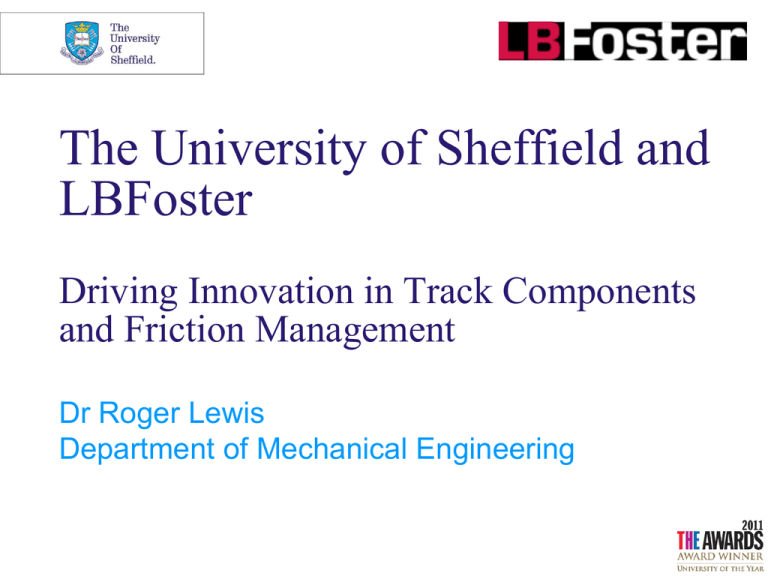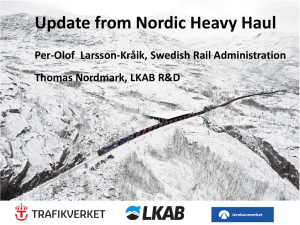University of Sheffield and LB Foster Innovation in Track & Friction
advertisement

The University of Sheffield and LBFoster Driving Innovation in Track Components and Friction Management Dr Roger Lewis Department of Mechanical Engineering Overhead Line Wear (Network Rail) 40 kN 60 kN 80 kN Some Current Railway Engineering Projects 0.9 1 0.8 3 0.7 0.6 0.5 0.4 0.3 0.2 0.1 2 0 -0.1 20 40 60 80 100 Traction Gels (LBFoster) Time (secs) Top of Rail FMs & Adhesion Measurement (LBFoster ) -440 1200 REPHIC SEVE STRO CATA ITION S TRAN RE SEVE TGamma vs wear, Wear Transitions and Mapping (RSSB, KTH) 0 Contact Pressure (MPa) Voltage Across Discs (V) Wheel/ Rail Isolation (LU, LBFoster) Rail Joint Innovation (LBFoster) 1000 800 600 400 0.00 CATASTROPHIC MILD 437.5 -- 500.0 375.0 -- 437.5 312.5 -- 375.0 250.0 -- 312.5 187.5 -- 250.0 125.0 -- 187.5 62.50 -- 125.0 0 -- 62.50 -445 -450 Wheel Wear Prediction (Alstom) Z [mm] 20 kN Contact Pressure (MPa) Wheel/Rail Contact Measurement Rail Grinding (Network Rail) -455 -460 -465 -470 -475 -820 0.05 0.10 0.15 Sliding Speed (m/s) 0.20 New Profile Vehicle 1 - Left Wheel Vehicle 2 - Left Wheel -800 -780 -760 -740 Y [mm] -720 -700 -680 Sheffield LBFoster Rail Products • Bonded insulated joints • Friction management • Wayside data collection • Direct fixation fasteners • Railcar products • Power rail systems • Coverboards • Track components 13/04/2015 © The University of Sheffield How we work together Today’s focus Consultancy Short term projects Friction management – test development and new product benchmarking Research PhD Wheel/rail contact – effect of third-body materials Knowledge Transfer Knowledge Transfer Partnership (KTP) (www.ktponline.org.uk) IBJ innovation Commercial Testing Short term projects Track components 13/04/2015 © The University of Sheffield Insulated joints: Areas of interest Condition Monitoring Endpost lipping problem Fatigue performance of whole joint Effect of decarburisation on fishplates Shear strength of epoxy glue layer 13/04/2015 © The University of Sheffield Fishplate Decarburisation • Decarburisation could affect the fatigue properties and weaken the fishplate • Testing will cyclically load steel fishplates with varying amounts of surface decarburisation • Effects of decarburisation on fishplates will be determined and methods for enhancing fatigue performance 13/04/2015 © The University of Sheffield Decarb layer in steel fishplates Cyclic Load Fishplate Support Blocks Test Base Endpost Lipping • Plastic deformation of the rail over the endpost causes electrical insulation failure • Twin-disc testing has attempted to model this behaviour • Testing will lead to understanding of this type of failure and the creation of techniques to reduce the problem and premature failure 13/04/2015 © The University of Sheffield Glued joint shear testing • A test to establish the difference in properties between various glues and insulating liner materials • Glued insulated joints are sectioned and the rail is pushed through the joint • Aim to introduce new and improved insulating materials to the market with better shear properties 13/04/2015 © The University of Sheffield Load Cell Joint Section Test Base Sheared Fishplate Full-scale IBJ testing • Standard and bespoke fatigue test apparatus currently used to conduct standard tests to verify joint performance (aim to not fail) • • 13/04/2015 © The University of Sheffield Aim now is to develop full life cycle testing (by changing the support set-up and the loads applied to the insulated joint) This test can then be used to assess impact on life of design and material changes Cyclic Loading Condition Monitoring • Development of an ultrasonic based system to monitor key interfaces underway • Technique proven on simple bolted interfaces 13/04/2015 © The University of Sheffield Transducers Mounted on Under-side Friction Management • Extensive adhesion tests carried out with and without contaminants (oil, water, leaves etc.) • Traction gels for adhesion enhancement (leaf layers generated in twin disc tests and gels applied) • Top of rail FMs (noise and vibration mitigation) • Effect of stick lubricants on wheel/rail isolation 0.9 1 • Third-body layers and oxides • Adhesion measurement Voltage Across Discs (V) 0.8 3 0.7 0.6 0.5 0.4 0.3 0.2 0.1 2 0 -0.1 0 13/04/2015 © The University of Sheffield 20 40 60 Time (secs) 80 100 Benefits of the collaboration • Access to University expertise and test facilities • Gearing for R&D projects – either through University or external sources • Short term problem solving • Long term approach possible 13/04/2015 © The University of Sheffield









